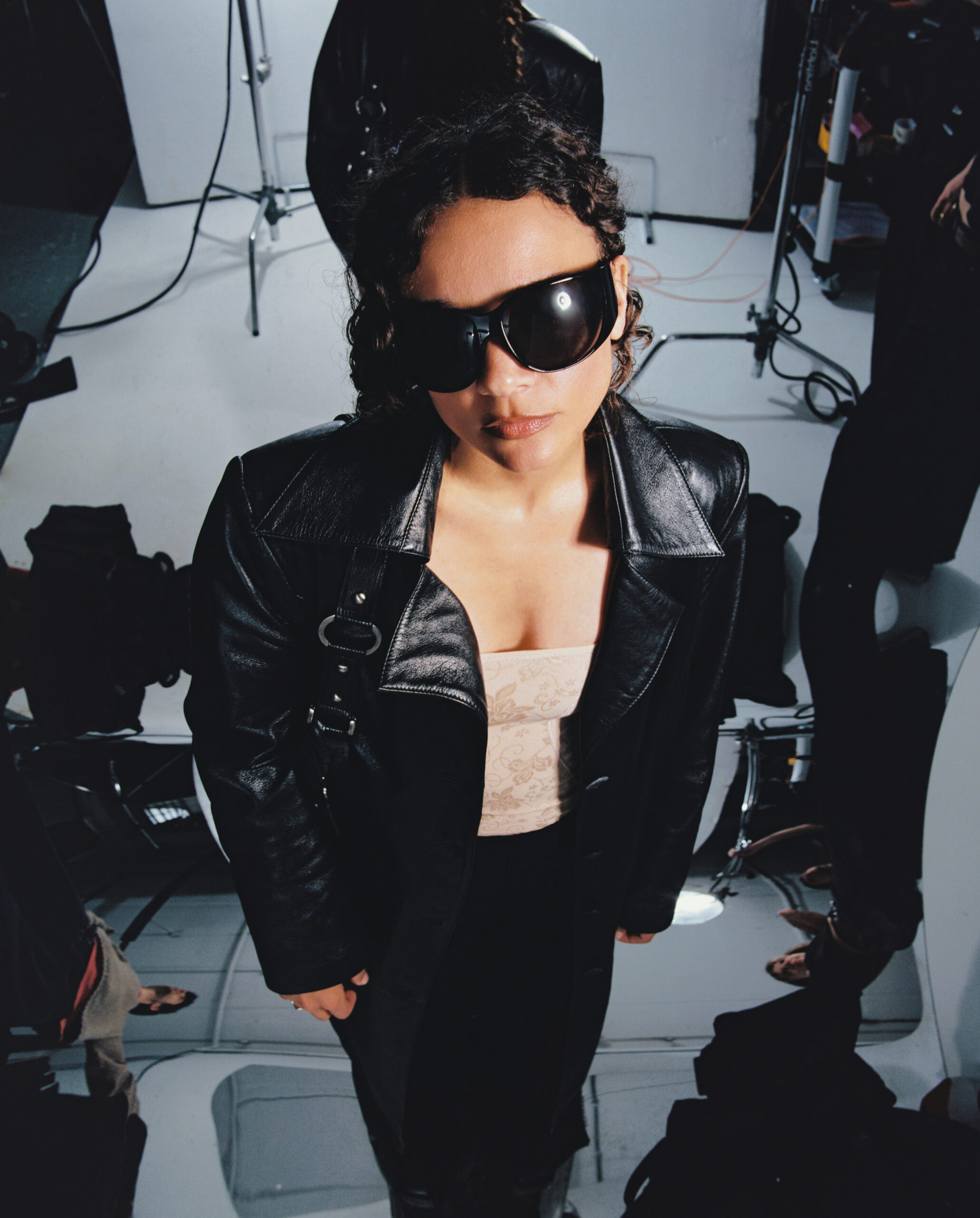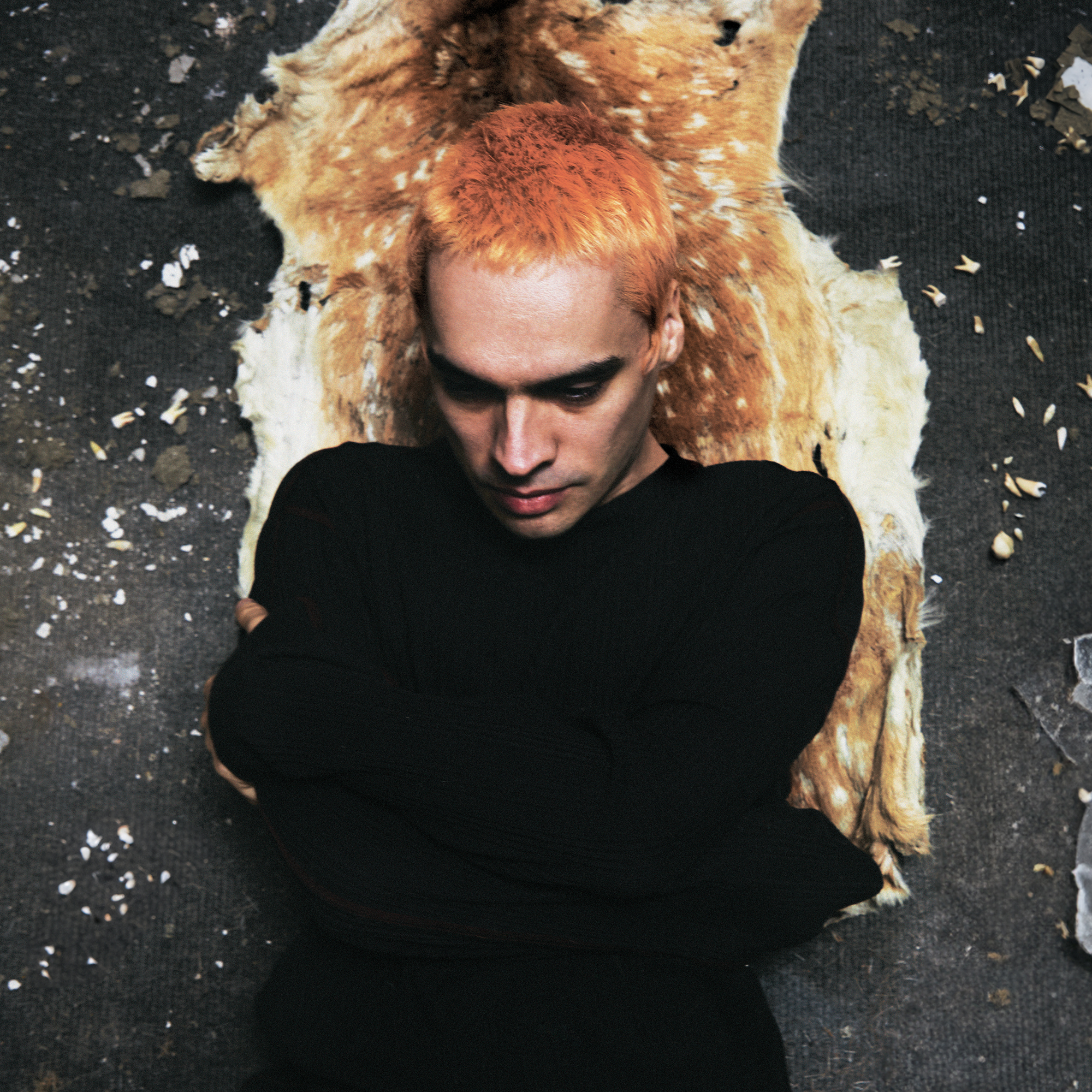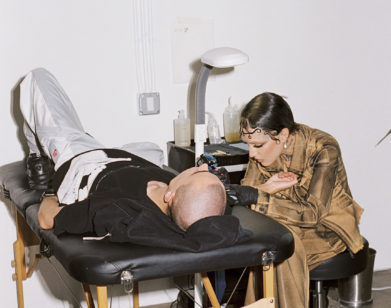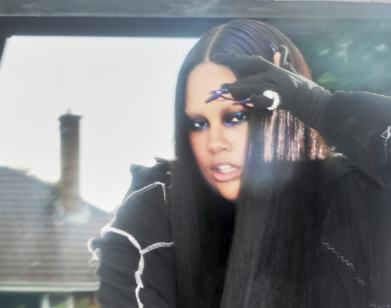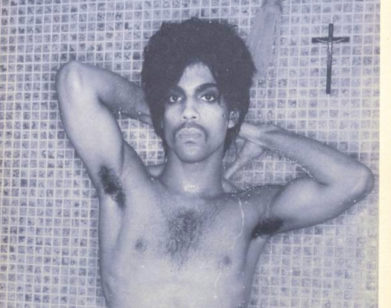IN CONVERSATION
Erika de Casier and Sega Bodega on Sinners, Samples, and Songwriting
Erika de Casier is all about the romance. After releasing her third studio album, Still, last month, the Danish singer-songwriter and producer has solidified uniquely recognizable niche of R&B electronica. Still threads a story of a relationship from honeymoon phase to heartbreak, richly composed in no small part by de Casier herself, with features from Blood Orange, Shygirl, and her home team of live instrumentalists. There’s a certain authenticity to everything de Casier presents to the world. ”It doesn’t feel like you’ve ever second guessed anything,” said her friend Sega Bodega when the two hopped on a Zoom call last month. The playful Paris-based club producer, who sent de Casier a sneak peak of his forthcoming new album, Dennis, out in April, has had her tunes on repeat lately. “Your lyrics are so appropriate for falling in love,” he remarked as the pair settled in to talk candidly about muses, sampling, and theories of collective consciousness.
———
ERIKA DE CASIER: Okay, face reveal. What’s up? How was the party?
SEGA BODEGA: We’ve been nonstop. We’ve had so many since I last saw you.
DE CASIER: That’s cool. It looked fun. I listened to your album that was leaked to me. Do you want to talk about it or would you rather keep that secret?
BODEGA: I want to talk about it, and I want to talk about yours.
DE CASIER: Okay. I hear a lot of longing in the songs. There’s one point where you sing in “Adulter8”…
BODEGA: That song’s stupid. I was imagining what it would be like to be juiced in a smoothie machine if you were a fruit.
DE CASIER: Ah!
BODEGA: I think I went into the thesaurus and typed in “diminish” or “adulterate,” so the lyrics are “dilute, adulterate, diminish, reduce me to nothing.” I was like, “Oh, that’s the song. I’m not even going to bother to write a sentence.” It’s kind of lazy if you think about it.
DE CASIER: No, I love that you dissect the word in a way. But I think the style of your vocals and the lyrics together have this ghostiness to them. I’m getting longing because it’s almost like somebody is calling from the grave.
BODEGA: That makes sense. That song specifically is supposed to start your day. It’s supposed to be your alarm clock after having just had a terrible sleep. You’re trying to figure out if you actually even woke up. Because sometimes you can be in this crazy state of mania or you’re so detached from yourself that you don’t even feel like you’re really alive. I get it when I’m really exhausted.
DE CASIER: Yeah.
BODEGA: I love your album, though. The production on it is so good. It’s so deep. You produce all your stuff, don’t you?
DE CASIER: Yeah, I produce most of it and co-produce some.
BODEGA: I felt like you were just giving more to the beats this time, if that makes sense.
DE CASIER: I definitely feel more confident in my productions. I used to rely on help from others and I was uncertain about whether I was good enough at it.
BODEGA: Really?
DE CASIER: Yeah. With Essentials, my first album, I was really afraid people would laugh at the sound of it.
BODEGA: That’s so weird. It doesn’t sound like that. It feels very confident in what it is. You’ve had such a consistent sound over everything you’ve done. It doesn’t feel like you’ve ever second guessed anything. What is this synth [on “Believe It”]?
DE CASIER: Oh, that’s actually a sample I took from John Beltran. It’s this track called “Ocean London Mix.” It’s a synth that’s throughout that whole track, and I took the beginning and pitched it and stuff.
BODEGA: Cool. Did you have to clear it?
DE CASIER: Yeah, but he was super sweet about it. I talked to him directly.
BODEGA: I have such fucking horror stories with sampling and I’m so scared of it now.
DE CASIER: I know. I had another harder one. It was on “Lucky.” I sampled this pop track from 2007 by Linda Kiraly. The main piano is just a direct sample from that.
SEGA BODEGA: Why did you call it Still?
DE CASIER: It was just a word that came up while writing notes about the music and searching for the right words, and I just really liked it. And in time, it began to make more and more sense to me. When I listen to my old music, I almost get an image of where I was when I was writing it. So I wanted to say, “this is a still of where I was.” It’s already been a while since I wrote it, and I feel disconnected to it—not in a bad way. And of course, it’s also the reference to “Still Jenny from the Block,” and ”Still D.R.E.” I thought that was funny.
BODEGA: It’s a funny reference.
DE CASIER: What about Dennis? You have Salvador, Romeo, why Dennis?
BODEGA: Okay, this is going to sound so strange when I say out loud, but I have this theory that all of our brains are connected to a machine that is pumping out information to all of us all at the same time.
DE CASIER: Like Matrix-y?
BODEGA: I think that something happens when we sleep. Our brains turn off and we process the day, we process our life, and it affects how we are the next day. Collective consciousness is such a real thing. I remember hearing that the television was made at the same time by two different people. One in the UK, one in Scotland. And they came around at the same time. How the fuck do you do that? I’ve had releases where I’ve released something at the same time as someone else and the similarities are so crazy. Like, me and Tommy Genesis in 2018 both put out records at the same time. Our artworks were so fucking similar, and we both had a song called “Daddy” on it, which was just a crazy coincidence. But I was also reading about Dennis the Menace. Do you know Dennis the Menace?
DE CASIER: The name rings a bell.
BODEGA: It’s a comic strip about this kid called Dennis the Menace. There’s a UK version and there’s an American version, and they appeared in newspapers on the exact same day in 1951.
DE CASIER: Oh, wait. I’ve seen the cartoon.
BODEGA: They were made by two completely different people. They had never talked to each other. Dennis the Menace, he’s a boy. He’s got a dog. His parents are the same. Everything was identical except how they looked. Me and Mayah [Alkhateri], who you met, we make Arabic shoegaze together. We were searching for any other Arabic shoegaze song and we could not find a single one until we found this Reddit thread with one song. There’s only two now—the one we made and this Iraqi guy—and they were released a day apart. And when she was making the artwork, she originally wanted to be wearing a veil. His artwork is a woman with a veil. These things aren’t coincidences. It happens all the fucking time. I just like the name Dennis also because backwards, it’s “sinned,” and I talk a lot about heaven and hell and sin. The meanings came slightly afterwards, but it just clicked. It’s like what you were saying about Still, it comes to you.
DE CASIER: That makes a lot of sense. You mentioned collective memory, and I feel like some of your songs are almost folk music or about folklore. “What is heaven, what is hell?” You know what I mean? Have you connected the folky elements in your music and the collective memory theory you have?
BODEGA: I haven’t, but it does make sense. I can hear the folkiness in the songs. I just think those topics don’t age badly. Biblical things just sound great. It’s beautiful to talk about morality and what makes people click. At this point I’ve rinsed the topic maybe a bit too much and I need to think about something else.
DE CASIER: That’s interesting because people ask me, “Have you written your last love song? Can you go on forever?” There are some topics that keep drawing you back in. I think you mix the religious world with a very dirty, sexy… In one of the tracks you say something like, “Who’s a bad girl?” Did you say that in “Kepko”?
BODEGA: Yeah.
DE CASIER: It’s a really interesting mix because when I was little, I went to a Catholic school. So for me, religion is something so shameful and there are things you can’t say.
BODEGA: That song’s about Mayah [Alkhateri]. When we first met, she definitely brought something out in me.
DE CASIER: Is she your muse?
BODEGA: Let’s say that. I can’t lie, that’s probably the case. I love how you talk about love. Lately, your music has just been on in the flat. It’s not on this album, but you have this line, “What’s your favorite color and are you a Gemini?” I’ve always loved how accurate those questions are when you meet somebody for the first time. You just want to feel close to them, even if you don’t really care what someone’s favorite color is, but you care about it because you care about them. It’s a great feeling. Your lyrics are so appropriate for falling in love.
DE CASIER: Wow. I’m very flattered that you would say that.
BODEGA: You kind of get the whole thing. You get the falling in love part well, you get the breaking up part well. Are the topics different across this album than the other ones, or is it coming from the same place of romance?
DE CASIER: It’s coming from the same place. It’s also touching on more of a toxic type of relationship, but I still wrote a lot of the songs from a place of hopefulness. I know a lot of artists that force the unhappy artist ideal. They have to go through all this pain to be able to do your art, but I don’t think that’s what it’s about. Life will give you pain. Don’t you worry. To search it is a bit much.
BODEGA: Yeah. When I’m so happy with someone and everything is perfect, the idea of losing it becomes a real thing I struggle with. It’s painful because you can hope for the best but you never know what’s going to happen. They could die tomorrow. So even when something’s so good, I worry so much.
DE CASIER: I get that. But you could also turn it around and say, “If we live forever and I have eternity with this person, would you be as thankful for the little moments?”
BODEGA: Probably not. That’s also why I make so much music, because I need to put as much out there as I can. That will live longer than I ever will. If I lived forever, maybe I would just spend the next hundred years on holiday and have nothing to show for it. I think that urgency to live means that you do your absolute most.
DE CASIER: That’s interesting. I think it’s powerful that you know that it’s death in the end. If I’m lucky enough to get old, I will be too old to walk and travel. It’s also about being realistic about how much time you have on this earth and what you want to put out there.
BODEGA: Everything changes after you die, too. Someone’s work and someone’s impact immediately becomes a different thing, and it’s so sad because many people don’t get the respect or the credit that they deserve until they’re dead. Why do we do that? We do that every single time.
DE CASIER: Maybe it becomes more magical because you know you won’t get more of it. I think that happens with a lot of painters where it’s like, there’s not any more coming from this mind, so the price goes up.
BODEGA: When it’s scarce.
DE CASIER: People like that.
BODEGA: It’s kind of like when you play in a small town, everybody will come. I remember when I moved to London, I wouldn’t go out that much. My favorite artist would be playing, I just wouldn’t go because they’ll play again. When you’re playing small towns in Europe, I’ve had people tell me they drove six hours to get there.
DE CASIER: Yeah. Are you going to play a lot of shows this year?
BODEGA: I have a tour booked in. Are you going to do the same? Is your setup the same as when I saw you in Switzerland?
DE CASIER: No. I had a full band, but now I’m going to travel with my drummer, Jonathan [Jull Ludvigsen], who you met, and then a visual setup. But I’m still figuring out how to translate it. You’re also a person for whom studio life is what you like about doing music, and all of a sudden you have to also be a performer. I’m still figuring it out. Each gig I do, I try something new. It keeps it interesting, but it’s also just me trying to find a way where I’m comfortable.
BODEGA: I think for me, lighting is what makes me comfortable. I like darkness and smoke. I don’t want to make eye contact with anybody.
DE CASIER: What do you do if you have to play day gigs?
BODEGA: I just struggle. I remember on my last tour, I had these curtains that would blow in the wind.
DE CASIER: Yeah, that was amazing.
BODEGA: My guy Sean Murphy designed that. He builds all my live shows.
DE CASIER: I’m trying to find a way to incorporate the sunshine or the rain for day shows, but it’s so difficult. It’s merciless.
BODEGA: Did you ever see Prince play at the Super Bowl? He does Purple Rain and it just starts pouring.
DE CASIER: No way.
BODEGA: It’s fucking amazing.
DE CASIER: That’s magical. I have to watch.
BODEGA: You should watch it. It’s like, you could not have planned this better. I read that right before he went up it started raining. Everyone was freaking out because there’s equipment on stage and stuff, and he was like, “Can we make it rain more?” I love that.
DE CASIER: That’s what I mean about working with your situation. It’s working backwards with what you already have.
BODEGA: What’s your favorite song from your album?
DE CASIER: Right now, it’s “Test It,” I think. I just like the feeling I get when I listen to it. It’s warm and intimate and still groovy.
BODEGA: My favorite is “The Princess.”
DE CASIER: Oh, wow.
BODEGA: And I love the last song, “Someone,” the strings in that. It’s the last song that has to give you the string moments. And “Anxious.” The whole thing’s strong. I love that you literally bring people in on “Right This Way.”
DE CASIER: What’s your favorite on yours?
BODEGA: There’s a song called “True,” which I really enjoyed making because—
DE CASIER: That’s the ballad.
BODEGA: It has constant key changes every time it starts again. It just goes up a key, up a key, up a key. It was really fun because if I put together the last chord in the chord progression and the first chord, it’s the same. It just goes from minor to major. “Kepko” is my favorite song by far, which is the “Who’s a bad girl?” one.
DE CASIER: I wrote about “Kepko” here. I wrote “arranged emotional chaos.”
BODEGA: I was basically like, “How many times in the song can I use this chord progression, but with a completely different beat every time?” I just need to have fun when I mix these songs, otherwise I’m bored.
DE CASIER: I know you’ve done cover songs as well, and they’re genius. But you might as well have been doing something else because it’s so innovative. I actually can’t think of another artist that sounds like you.
BODEGA: Thanks.
DE CASIER: I saw on your Instagram you asked, “Any vocal effects? Send me something.”
BODEGA: I get bored of how my voice sounds so quickly. I don’t like my voice, so I end up just trying to cloud it in these effects—
DE CASIER: You don’t like your voice? What don’t you like?
BODEGA: I just don’t think I’m a good singer. I surround myself with amazing vocalists, so I’m always stupidly comparing myself to them. I shouldn’t, but I wish I had a woman’s voice.
DE CASIER: So when you put your vocals on the track, how do you make it not sound like you?
BODEGA: A lot of times I don’t even write in a melody. I’ll sing a rhythm as one note. And then I have this thing on Logic called flex pitch, where you can just change all the notes afterwards. A lot of the time, the melody I put in becomes completely different. You’re dragging the notes around, maybe speeding them up, and that’s fun but it ends up just fucking with your voice. It gets distorted, which I like.
DE CASIER: That’s interesting.
BODEGA: If we work together, I’ll probably end up doing that to your voice, too.
DE CASIER: I’d love to hear it. I’m looking forward to that day.
BODEGA: We need to plan that.
DE CASIER: I’m playing a gig in Paris in May.
BODEGA: Oh yeah, let’s do it.

